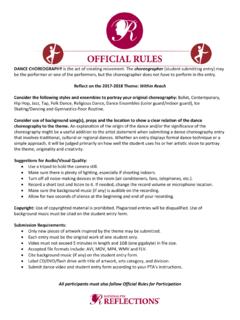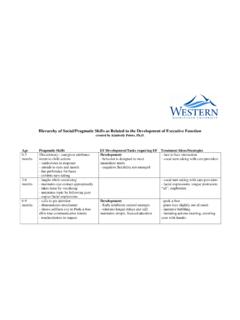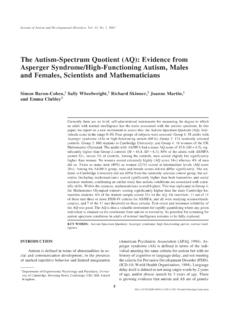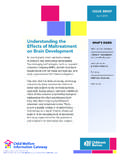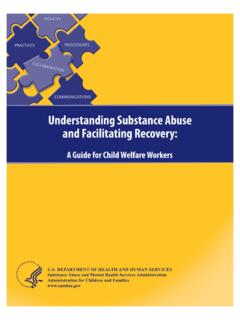Transcription of Executive Skills Questionnaire - NYS PTA
1 25 Executive Skills Questionnaire Peg Dawson & Richard Guare Step I: Read each item below and then rate that item based on the extent to which you agree or disagree with how well it describes you. Use the rating scale below to choose the appropriate score. Then add the three scores in each section. Use the Key on page 2 to determine your Executive skill strengths (2-3 highest scores) and weaknesses (2-3 lowest scores). Strongly disagree 1 Tend to agree 5 Disagree 2 Agree 6 Tend to disagree 3 Strongly agree 7 Neutral 4 Item Your score 1. I don t jump to conclusions 2. I think before I speak. 3. I don t take action without having all the facts. YOUR TOTAL SCORE: 4. I have a good memory for facts, dates, and details. 5. I am very good at remembering the things I have committed to do.
2 6. I seldom need reminders to complete tasks YOUR TOTAL SCORE: 7. My emotions seldom get in the way when performing on the job. 8. Little things do not affect me emotionally or distract me from the task at hand. 9. I can defer my personal feelings until after a task has been completed YOUR TOTAL SCORE: 10. No matter what the task, I believe in getting started as soon as possible. 11. Procrastination is usually not a problem for me. 12. I seldom leave tasks to the last minute YOUR TOTAL SCORE: 13. I find it easy to stay focused on my work. 14. Once I start an assignment, I work diligently until it s completed. 15. Even when interrupted, I find it easy to get back and complete the job at hand. YOUR TOTAL SCORE: 16. When I plan out my day, I identify priorities and stick to them 17.
3 When I have a lot to do, I can easily focus on the most important things . 18. I typically break big tasks down into subtasks and timelines. YOUR TOTAL SCORE: 19. I am an organized person. 20. It is natural for me to keep my work area neat and organized. 21. I am good at maintaining systems for organizing my work. YOUR TOTAL SCORE: 26 Strongly disagree 1 Tend to agree 5 Disagree 2 Agree 6 Tend to disagree 3 Strongly agree 7 Neutral 4 Item Your score 22. At the end of the day, I ve usually finished what I set out to do. 23. I am good at estimating how long it takes to do something. 24. I am usually on time for appointments and activities. YOUR TOTAL SCORE: 25. I take unexpected events in stride.
4 26. I easily adjust to changes in plans and priorities. 27. I consider myself to be flexible and adaptive to change. YOUR TOTAL SCORE: 28. I routinely evaluate my performance and devise methods for personal improvement. 29. I am able to step back from a situation in order to make objective decisions. 30. I read situations well and can adjust my behavior based on the reactions of others. YOUR TOTAL SCORE: 31. I think of myself as being driven to meet my goals. 32. I easily give up immediate pleasures to work on long-term goals. 33. I believe in setting and achieving high levels of performance. YOUR TOTAL SCORE: 34. I enjoy working in a highly demanding, fast-paced environment. 35. A certain amount of pressure helps me to perform at my best. 36. Jobs that include a fair degree of unpredictability appeal to me.
5 YOUR TOTAL SCORE: KEY Items Executive Skill Items Executive Skill 1 - 3 Response Inhibition 4 - 6 Working Memory 7 - 9 Emotional Control 10 - 12 Task Initiation 13 - 15 Sustained Attention 16 - 18 Planning/Prioritization 19 - 21 Organization 22 - 24 Time Management 25 - 27 Flexibility 28 - 30 Metacognition 31 - 33 Goal-Directed Persistence 34-36 Stress tolerance Strongest Skills Weakest Skills Executive Skill Definitions 27 Response Inhibition: The capacity to think before you act this ability to resist the urge to say or do something allows us the time to evaluate a situation and how our behavior might impact it. In the young child , waiting for a short period without being disruptive is an example of response inhibition while in the adolescent it would be demonstrated by accepting a referee s call without an argument.
6 Working Memory: The ability to hold information in memory while performing complex tasks. It incorporates the ability to draw on past learning or experience to apply to the situation at hand or to project into the future. A young child , for example can hold in mind and follow 1 2 step directions while the middle school child can remember the expectations of multiple teachers. Emotional Control: The ability to manage emotions in order to achieve goals, complete tasks, or control and direct behavior. A young child with this skill is able to recover from a disappointment in a short time. A teenager is able to manage the anxiety of a game or test and still perform. Sustained Attention: The capacity to maintain attention to a situation or task in spite of distractibility, fatigue, or boredom. Completing a 5 minute chore with occasional supervision is an example of sustained attention in the younger child . The teenager is able to attend to homework, with short breaks, for one to two hours.
7 Task Initiation: The ability to begin projects without undue procrastination, in an efficient or timely fashion. A young child is able to start a chore or assignment right after instructions are given. A high school student does not wait until the last minute to begin a project. Planning/Prioritization: The ability to create a roadmap to reach a goal or to complete a task. It also involves being able to make decisions about what s important to focus on and what s not important. A young child , with coaching, can think of options to settle a peer conflict. A teenager can formulate a plan to get a job. Organization: The ability to create and maintain systems to keep track of information or materials. A young child can, with a reminder, put toys in a designated place. An adolescent can organize and locate sports equipment. Time Management: The capacity to estimate how much time one has, how to allocate it, and how to stay within time limits and deadlines. It also involves a sense that time is important.
8 A young child can complete a short job within a time limit set by an adult. A high school student can establish a schedule to meet task deadlines. Goal directed persistence: The capacity to have a goal, follow through to the completion of the goal, and not be put off by or distracted by competing interests. A first grader can complete a job in order to get to recess. A teenager can earn and save money over time to buy something of importance. Flexibility: The ability to revise plans in the face of obstacles, setbacks, new information or mistakes. It relates to an adaptability to changing conditions. A young child can adjust to a change in plans without major distress. A high school student can accept an alternative such as a different job when the first choice is not available. Metacognition: The ability to stand back and take a birds eye view of oneself in a situation. It is an ability to observe how you problem solve. It also includes self monitoring and self evaluative Skills ( , asking yourself, How am I doing?)
9 Or How did I do? ). A young child can change behavior is response to feedback from an adult. A teenager can monitor and critique her performance and improve it by observing others who are more skilled. Stress Tolerance: the ability to thrive in stressful situations and to cope with uncertainty, change, and performance demands. 28 Checklist for Designing Interventions Intervention Steps 1. Establish behavioral goal What s the Executive skill involved? _____ Problem behavior: _____ Goal behavior: _____ 2. What environmental supports will be provided (check all that apply) ___ Change physical or social environment ( , add physical barriers, reduce distractions, provide organizational structures, reduce social complexity, etc.) ___ Change the nature of the task ( , make shorter, build in breaks, give something to look forward to, create a schedule, build in choice, make the task more fun, etc.) ___ Change the way adults interact with the child ( , rehearsal, prompts, reminders, coaching, praise, debriefing, feedback) 3.
10 What procedure will be followed to teach the skill? Who will teach the skill/supervise the procedure? What steps will the child follow? 1. 2. 3. 4. 5. 6. 4. What incentives will be used to encourage the child to learn, practice, or use the skill (check all that apply) ___ Specific praise ___ Something to look forward to when the task (or a piece of the task) is done ___ A menu of rewards and penalties Daily reward possibilities: Weekly reward possibilities: Long-term reward possibilities: 5. What is your outcome measure? How will you know if your intervention was successful? 29 Environmental Modifications and Teaching Strategies for Specific Executive Skills Executive Skill Environmental Modification Teaching Strategy Response Inhibition Increase external controls Restrict access Post home or classroom rules and review regularly Prompt the child (external to internal) Teach wait/stop Teach delayed gratification (apps: Token Board) Discourage multi tasking , build in technology breaks rather than having kids combine homework with technology use Working Memory Use orthotic memory devices Principle of off loading Agenda books/calendars To do lists (paper, white board to post prominently) Electronic devices & apps (Wunderlist, Nudge, BugMe!)
